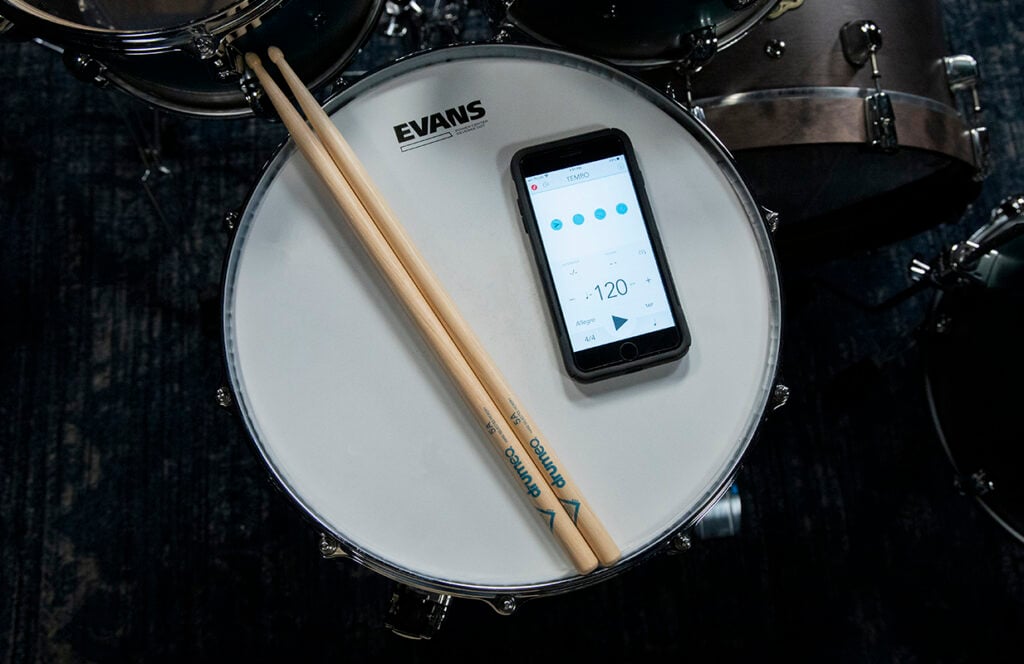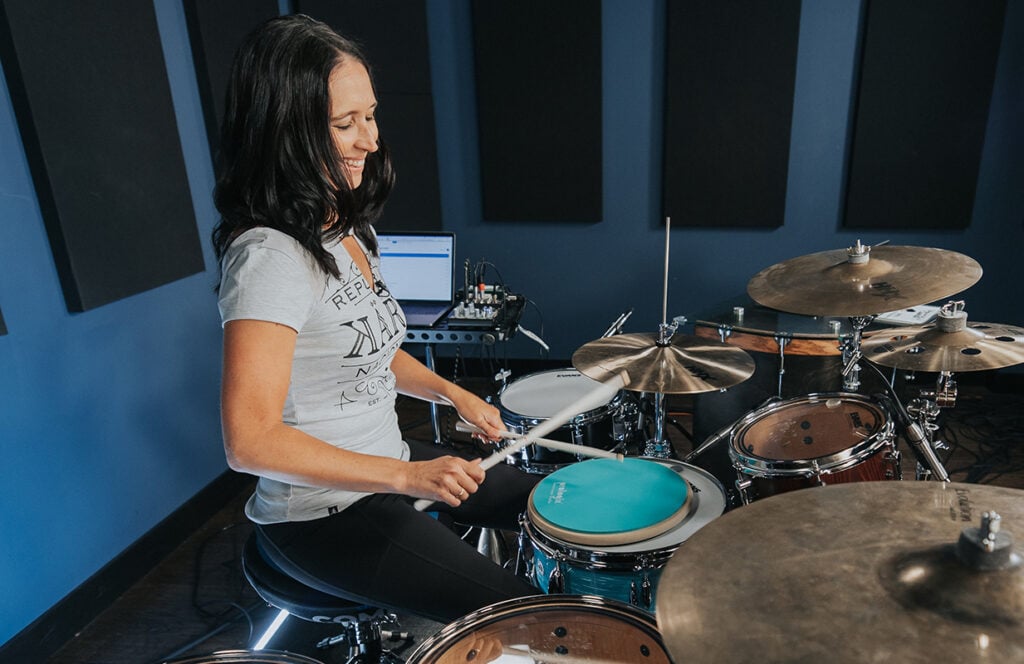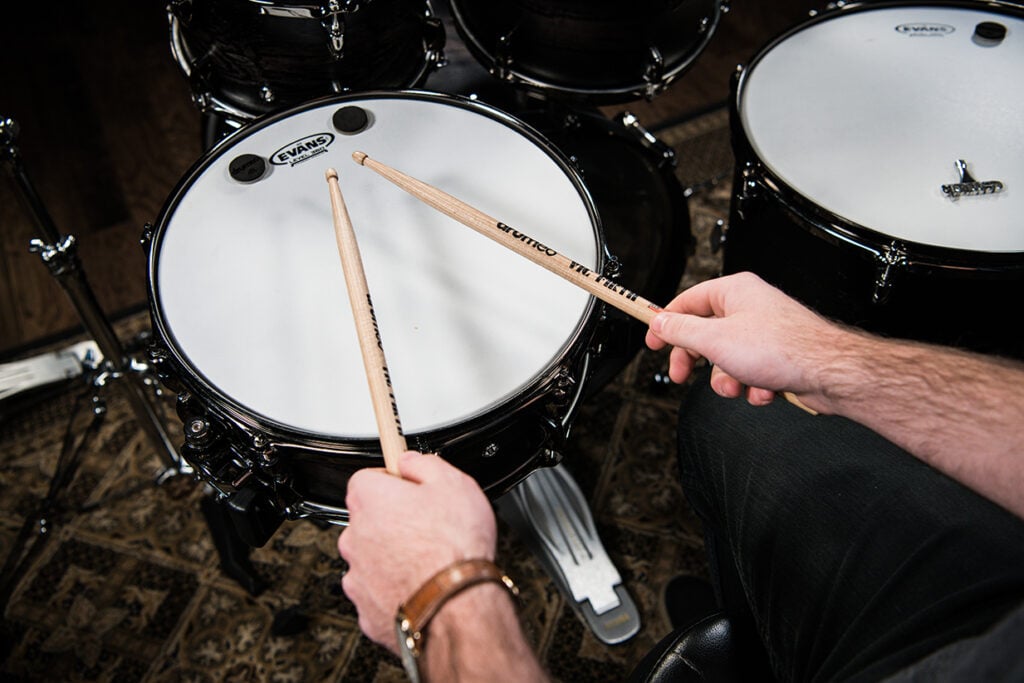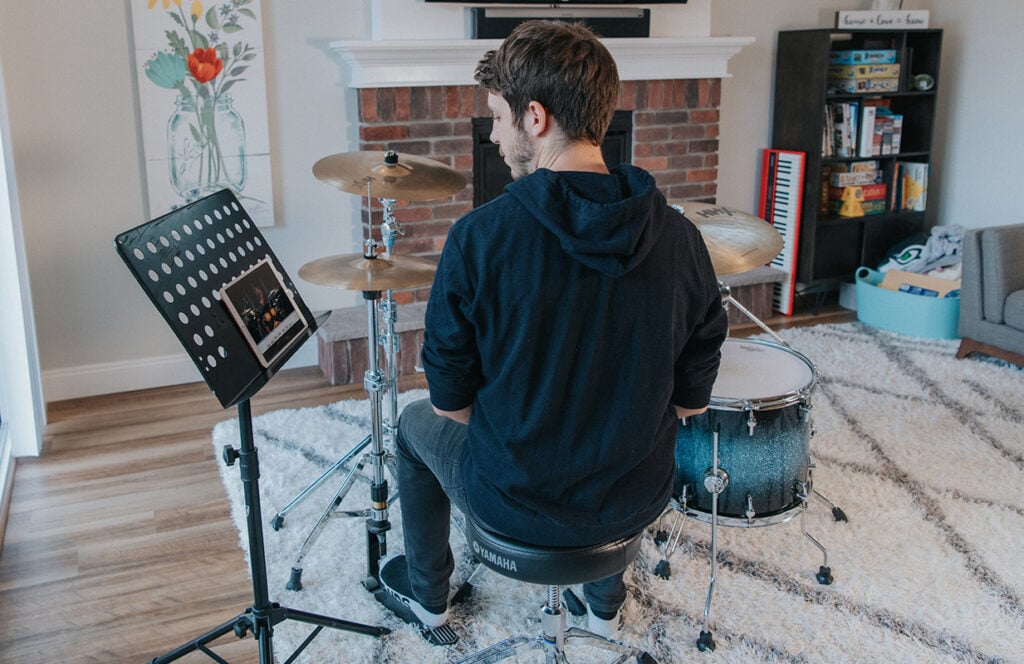The single paradiddle is one of the most popular drum rudiments. It combines the two building blocks of drumming – single strokes and double strokes – and sounds awesome in fills, beats, and solos.

The single paradiddle consists of two alternating single strokes followed by a double stroke.
Right, left, right, right. Then flip it in reverse and lead with your opposite hand.
The paradiddle is one of the most common drum rudiments and can be found in more songs than you think. It can be played with just your hands, split between hands and feet, played in reverse and more.
This practical rudiment works your single and double strokes in tandem and can add more color and variety to drum beats and fills.
Here’s what the single paradiddle sounds like:
You can use this tool to practice along at the tempo that’s best for you (it’s the one Drumeo members use when practicing with the 3000+ play-along tracks inside our members area).
► Click here if you want to learn how to read drum music
You should be able to play the pattern consistently and smoothly, switching between leading with your right and leading with your left (the biggest challenge for anyone new to paradiddles). Pay close attention to the double stroke in particular. Make sure the spacing between each note is consistent.
You’ll know your paradiddles are top notch when they start to sound as consistent as a single stroke roll!
Here are some tips for playing paradiddles.

When you’re first learning how to play something, it’s fine to test it out without a metronome as you get used to the pattern. But you shouldn’t go click-free for long. The metronome will help you develop a better internal clock and show you exactly where the timing of your strokes is inconsistent (or where it’s right on the grid).
You can buy a physical metronome at a music store or download a metronome app online.

While it might be tempting to get up to speed as quickly as possible – especially if you’re feeling confident – make sure you’re really playing paradiddles well before you increase the tempo.
Be honest with yourself and don’t move on until you’ve really got it down. Don’t just say “it’s good enough”. Develop control first, and speed will come later.
Try starting with your metronome set to 60 BPM and then slowly work your way up 5 BPM at a time.

If you’re a right-handed drummer, you probably default to starting paradiddles with your right hand. Even though this rudiment naturally alternates the lead hand, you’d be surprised how different it feels starting the whole run with the other side.

It’s easiest to correct your posture or grip immediately if you’re watching yourself in a mirror. Try to set up a practice pad and a snare stand in front of a full length mirror if you can.
Maybe your strokes don’t look even. Maybe the height of your right stick doesn’t match the height of your left. You might even notice you’re gripping your left hand too hard. Use your reflection as a window into how you’re doing. It’s like becoming your own drum teacher!

While playing in front of a mirror will help you fix issues on the fly, you might not realize when something is wrong during your practice session. Sometimes we don’t notice issues while we’re in the middle of playing – especially if we’re concentrating hard.
Whether you’re propping your phone on your dresser or capturing it all with a camera and tripod, it’s helpful to watch your practice sessions and critique yourself from a ‘third party’ perspective.
We’ve put together a playlist with drumless tracks at different tempos so you can practice this rudiment over real music:
Once you’re comfortable playing paradiddles on a practice pad or single drum, you should try them on the drum set.
You can play a paradiddle tons of different ways on the kit, so here are some exercises to get you started.
#1:
#2:
#3:
#4:
#5:
Once you’ve worked through these exercises, come up with your own ideas. Move the paradiddle around the kit, changing surfaces and sounds. Go between a cymbal and the snare drum, or try a paradiddle between your hands and feet.
Learn these tunes to get comfortable with this rudiment in practice:

This song is a great example of a paradiddle pattern played between the hands and feet.

This legendary Rush tune also uses paradiddles. Pay attention to the ghost notes and dynamics when learning this part.

This tune also uses a paradiddle pattern between the kick and snare.
With enough solid practice, you should start feeling more confident in your playing. From drum beats and drum rolls to fills and solos, mastering the single paradiddle will get you one step closer to becoming the capable drummer you’re meant to be.
If you’ve enjoyed this rudiment, you’ll also like the paradiddle-diddle, which ends with two sets of double strokes instead of one.
Once you’ve got a good handle on the single paradiddle, the next most important drum rudiment to learn is the double paradiddle.


By signing up you’ll also receive our ongoing free lessons and special offers. Don’t worry, we value your privacy and you can unsubscribe at any time.
We use cookies for traffic data and advertising. Cookie Policy »